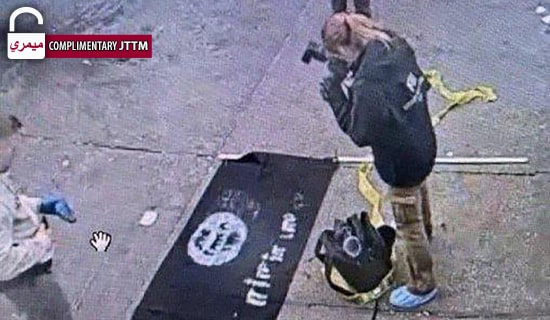On June 12, 2001, PA Chairman Yasser Arafat agreed "conditionally" to CIA Director, George Tenet's "Work Plan" for establishing the cease fire. The American Administration refrained from officially revealing the details of the document, but the Palestinian dailies published ample information about the document and about the negotiations that preceded it.
A Verbal and Conditional Palestinian Acceptance
The Palestinian media emphasized that Arafat had not signed any document. Palestinian Minister of Information, Yasser Abd Rabbo, told the Al-Quds daily that Arafat's agreement was delivered verbally to Tenet and was accompanied by a letter, from Arafat to Tenet, stating three Palestinian reservations. Abd Rabbo explained that "President Arafat emphasized he had not signed, nor would he sign, any security document because such a document should be an integrative package that includes all the political and security aspects for the implementation of the Mitchell Commission recommendations, and first and foremost, stopping settlements."[1]
According to the Jerusalem daily Al-Quds, Arafat's reservations were ultimately accepted by Tenet, who entered amendments into the document. The three reservations related to the establishment of buffer zones between Israel and the PA territories, the timetable for the lifting of the Israeli closure, and the Palestinian refusal to carry out arrests.
The Arrest of Terrorists
The Israeli demand to arrest 'Hamas' and 'Palestinian Islamic Jihad' activists, that was included in the original Tenet proposal, has encountered a total Palestinian rejection. However, it seems that eventually, the Palestinians and Americans have reached an understanding that paved the way for reaching the "Work Plan."
The American document stated, according to the Palestinian daily Al-Ayyam, that both sides will pass to each other information regarding threats, "terror" operations, or such movement of people to areas belonging to the other side that form a threat, in addition to the halting, detaining, and questioning ["tawqif, hajz, wa-istijwab"] of the planners of attacks, as well as reporting this matter to the joint Palestinian-Israeli security committee, in which the Americans will participate. [2]
Al-Quds, on the other hand, quoted a Palestinian source saying that in Tenet's document "there was no mentioning of the need for a PA campaign of arrests among the leaders and cadres of 'Hamas' and the 'Islamic Jihad'". Palestinian Minister of Information, Yasser Abd Rabbo, told Al-Quds that the third article in Arafat's letter of reservations refers to the issue of arrest demanded by Israel and it states: "the Palestinian side is committed to the implementation of the Mitchell report in its entirety and any breach of this agreement, partially or wholly, does not obligate the Palestinian side."[3]
Statements by anonymous American Administration officials to the American press, reveal that there is some truth in the Palestinian claims that the US withdrew from the original demand to arrest 'Hamas' and 'Islamic Jihad' activists. A senior State Department official told The Washington Post that the US endorses the Israeli demand for a roundup of Palestinian militants, but in contradiction to the Palestinian statements he added that "such a commitment was implicit in Arafat's agreement to renew security cooperation." [4]
The New York Times reported that "the sticking point" regarding the arrest was "massaged". It quoted American Administration officials saying "Mr. Arafat had promised Mr. Tenet to arrest Islamic fundamentalists, [but only] those who were planning [new] terrorist attacks, rather than those whom Israel accuses of previous attacks." It seems that this logic was ultimately accepted by the US, since the American official added that, "The issue that is most important is to go after those who in these very days are planning terrorist operation. That's the challenge."[5]
It seems that Israel also agreed, albeit tacitly, to this formula that relieves the PA from the need to make post-factum arrests. The Israeli daily Yediot Ahronot reports that Tenet was accepting "an Israeli request" when he emphasized the article referring to immediate arrest of 'Hamas' and 'Islamic Jihad' terrorists. "In the modified document, the demand talks about an immediate arrest of "ticking bombs" in accordance with Israeli lists that will be passed to the Americans. Israel claims that there are at least twenty such terrorists in different stages of executing suicide bombings. Tenet's modified document does not specify the names of the terrorists." [6]
The Buffer Zones
The first article in Arafat's letter of reservations to Tenet referred to the establishment of buffer zones between Israel and the PA territories. "The Palestinian side completely rejects the establishment of buffer zones between the two sides "whatever they mean", Arafat's letter read.[7] Al-Ayyam reported that "the President [Arafat] strongly emphasized his total rejection to the establishment of buffer zones to prevent attacks from the Palestinian territories and said this unacceptable idea was not part of the Mitchell Commission recommendations." [8]
The Timetable for Lifting the Closure
The second article in Arafat's letter of reservations related to the timetable for lifting the closure, or in the Palestinians' language, "the siege". "The US is called upon to fulfill its role in order to end all forms of siege and irregular measures and return to the situation prior to September 28, 2000, in accordance with what was agreed upon in the Sharm Al-Sheikh summit and in the agreement with Israeli Foreign Minister, Shimon Peres, which stated that the siege and other measures must end within forty-eight hours at most."[9]
Tenet's document calls upon both parties to hold a meeting of the joint Palestinian-Israeli security committee within a week, in which American officials will participate. Forty-eight hours later, Israel will begin "steps for the tangible withdrawal of its forces and heavy weapons from the posts they have taken since September 28." [10]
In Tenet's original proposal, a two month cooling-off period was set, but it seems that the Americans have agreed to the Palestinian demand to include political elements, such as the freeze on settlements, simultaneously with the implementation of the security agreement, rather than after a long cooling-off period, as was demanded by Israeli PM, Sharon. A senior American official told The New York Times that "a push for some diplomacy would probably be made despite Mr. Sharon's desire for a cooling-off period of at least two months between a complete halt to violent incidents and negotiations."[11]
The Security Cooperation and Coordination
Al-Ayyam reported at length about the components of the renewed security cooperation, as was set in Tenet's document: "The American document talks about renewing the daily operation of the Palestinian-Israeli District Coordination Office [DCO] offices, in accordance with the criteria that existed prior to September 28; it also stated that the walls that were built between the Israeli and Palestinian sections should be removed in the coming stages."
"Security coordination meetings will be held at least once a week... disagreements will be solved via the joint Israeli-Palestinian security committee, in which American security official will participate.
"The American document refers to the supply of video conference apparatuses by the US in order to facilitate the dialogue between the heads of security on both sides."
"The documents call on both sides to specify major points of friction in which security forces of both sides will deploy. Each side will report to the other side the names of security personnel deployed in these areas. Both sides will agree on actual measures to strengthen demonstrations-free zones. In addition, both sides will act to specify emergency communication measures." [12]
Additional Measures to be Carried out by Israel
Al-Ayyam also mentions additional measures to be carried out by Israel: "The Israeli authorities shall begin lifting the internal closure from the Palestinian territories, the external closure, the opening of the Gaza airport and seaport, the crossing points, the internal roads, and reducing the number of check points as much as the security situation allows."
"The Israeli government will refrain from attacking targets that belong to the PA, whether military or civilian. Palestinian institutions or residential areas. Israel will refrain from provocative actions against civilians."
"According to Tenet's document, Israel shall release all the Palestinians it arrested during its raids that are not connected with "terror" activities. The American document obligates Israel to conduct military and police investigations of incidents in which Palestinians were killed by the Israeli army."
"The document obligates the Israeli government to avoid the use of lethal ammunition and adopt non-lethal measures in dealing with demonstrations, in order to prevent deaths and injuries..."
"The Israeli officials will take measures against Israelis who incite to or plan violent actions against the Palestinians. The Israeli authorities will report to the joint security committee on such actions. In addition, the Israeli authorities will take action to prevent Israeli groups from carrying out violent actions against Palestinians." [13]
Additional Measures to be Carried Out by the PA
Al-Ayyam reports additional measures to be carried out by the PA: "The collection of mortar shells and unauthorized weapon, [the destruction of] explosive factories and exerting efforts to prevent weapon smuggling. The Palestinian side will report to the joint security committee regarding this matter."
"The document called to refrain from incitement, and stated that the Palestinian officials will refrain from incitement or from supplying cover to Palestinian elements who carry attacks against Israeli targets." [14]
*Yotam Feldner is MEMRI's Director of Media Analysis.
[1] Al-Quds (PA), June 13, 2001.
[2] Al-Ayyam (PA), June 13, 2001.
[3] Al-Quds (PA), June 13, 2001.
[4] The Washington Post, June 13, 2001.
[5] The New York Times, June 13, 2001.
[6] Yediot Ahronot (Israel), June 13, 2001.
[7] Al-Quds (PA), June 13, 2001.
[8] Al-Ayyam (PA), June 13, 2001.
[9] Al-Quds (PA), June 13, 2001.
[10] Al-Ayyam (PA), June 13, 2001.
[11] The New York Times, June 13, 2001.
[12] Al-Ayyam (PA), June 13, 2001.
[13] Al-Ayyam (PA), June 13, 2001.
[14] Al-Ayyam (PA), June 13, 2001.




